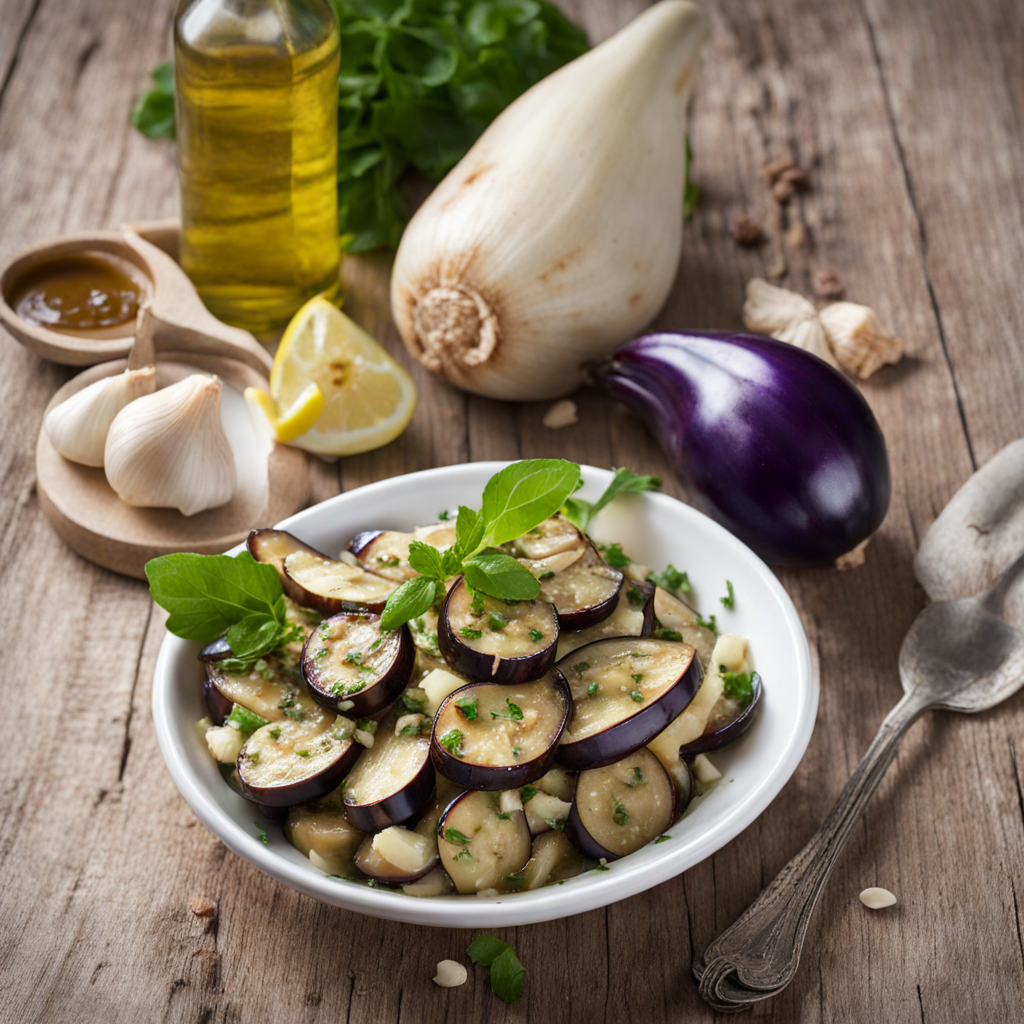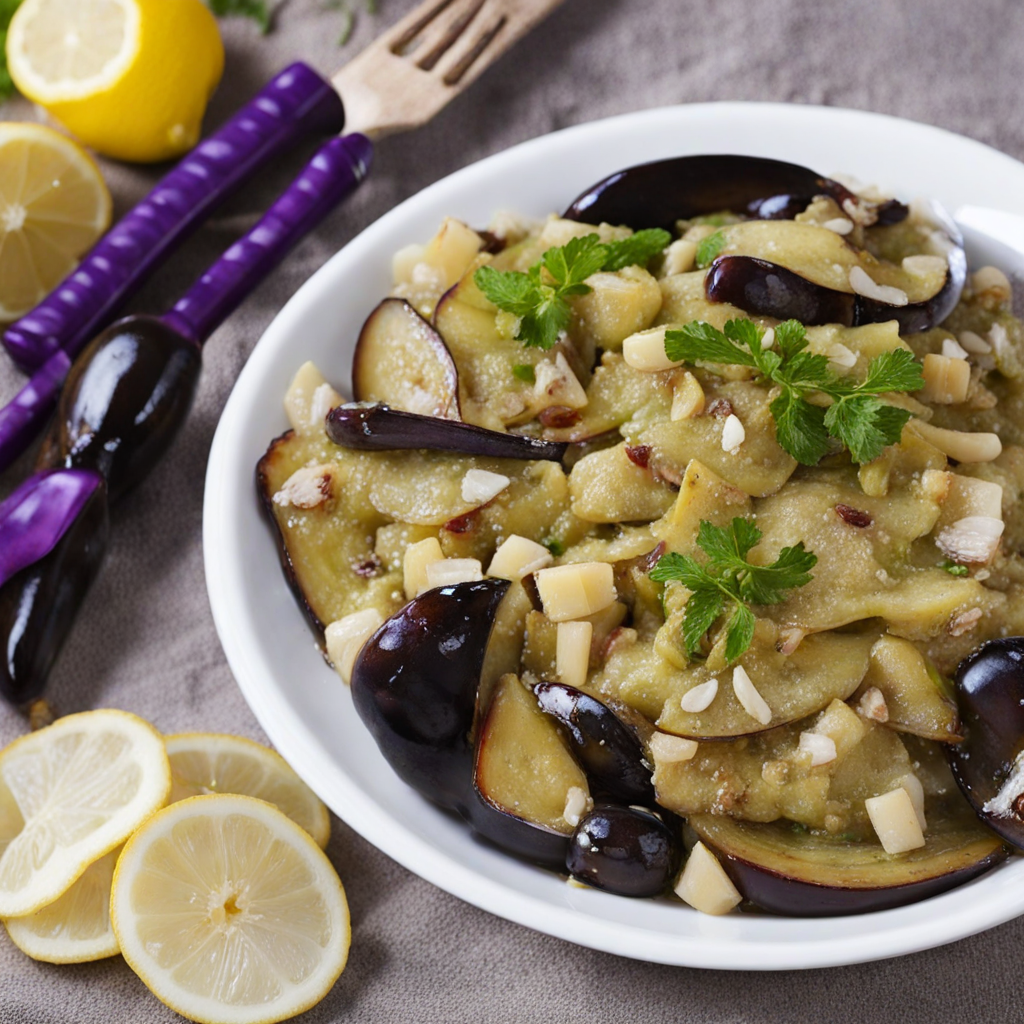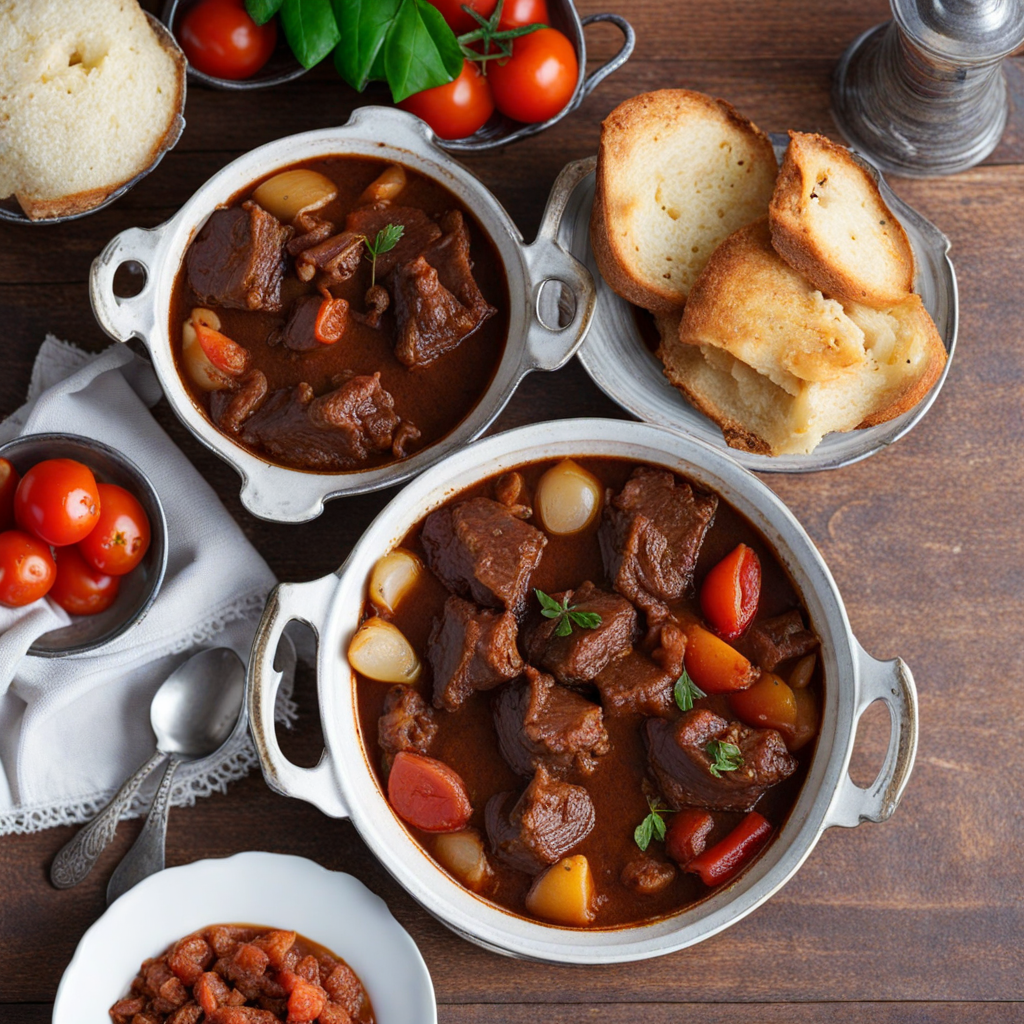Melitzanosalata
Melitzanosalata is a delightful Cypriot appetizer that showcases the rich flavors of roasted eggplant. The preparation begins with charred eggplants, which are often grilled or roasted until their skins are blackened and the flesh becomes soft and smoky. This cooking method infuses the dish with a distinct, earthy aroma that tantalizes the senses. Once cooled, the eggplants are peeled, and the creamy, tender flesh is mashed or blended to create a velvety texture that serves as the base for this traditional dip. To enhance the natural flavors of the eggplant, a medley of ingredients is added, including tahini, garlic, lemon juice, and olive oil. The tahini contributes a nutty richness, while the garlic brings a sharp, pungent kick. The bright acidity of the lemon juice balances the dish, cutting through the creaminess, and the olive oil adds depth and a lush mouthfeel. The result is a harmonious blend of flavors that is both refreshing and satisfying, perfect for dipping or spreading. Typically served with warm pita bread or fresh vegetables, Melitzanosalata is a versatile dish that can be enjoyed as part of a meze platter or as a standalone starter. It embodies the simplicity and freshness of Mediterranean cuisine, making it an ideal choice for those seeking to explore new taste sensations. The vibrant colors and rich flavors of this eggplant dip invite anyone to indulge in the culinary wonders of Cyprus.
How It Became This Dish
The History of Μελιτζανοσαλάτα: A Culinary Gem of Cyprus #### Origins Μελιτζανοσαλάτα, or eggplant salad, is a cherished dish in Cypriot cuisine, reflecting the island's rich culinary heritage and its diverse cultural influences. The dish's name derives from "μελιτζάνα," which means eggplant in Greek, and "σαλάτα," meaning salad. While the exact origins of Μελιτζανοσαλάτα are difficult to pinpoint, it is widely believed that it emerged during the Byzantine period, when eggplant was first introduced to the Mediterranean from the Middle East. Eggplant, a key ingredient in Μελιτζανοσαλάτα, has a storied history itself. It is thought to have been cultivated in India as early as 2000 BCE and eventually made its way to the Mediterranean through trade routes. By the time it reached Cyprus, it had already become a staple in various cuisines, including those of the Arabs and the Ottomans. These influences are evident in the way eggplant is prepared and enjoyed in Mediterranean cultures, highlighting how culinary practices are often shared and adapted through interaction and exchange. #### Cultural Significance In Cyprus, Μελιτζανοσαλάτα is more than just a dish; it is a symbol of communal dining and hospitality. Traditionally served as part of a meze platter—an assortment of small dishes meant to be shared—this salad embodies the Cypriot spirit of togetherness. The meze culture encourages conversation and connection, making it a vital part of social gatherings, celebrations, and family meals. During festive occasions and important events, Μελιτζανοσαλάτα often takes center stage, showcasing the importance of food in Cypriot culture as a means of bringing people together. The dish also holds a significant place in the culinary practices of the Greek Cypriots and Turkish Cypriots, emphasizing the shared heritage of the island's communities. Over centuries of coexistence, the gastronomy of Cyprus has woven a tapestry of flavors and techniques, with Μελιτζανοσαλάτα serving as a delicious reminder of this collaboration. The use of common ingredients—such as olive oil, garlic, and lemon—reflects the agricultural bounty of the island, while also highlighting the importance of seasonal and local produce in Cypriot cooking. #### Development Over Time As Cyprus underwent various historical changes, so too did Μελιτζανοσαλάτα. The dish has evolved through centuries of foreign rule, cultural exchange, and globalization. During the Ottoman period, which lasted from the 16th to the 20th century, Cypriot cuisine was heavily influenced by Turkish culinary traditions. The Ottoman Empire's vast reach facilitated the exchange of spices, cooking techniques, and regional ingredients. This led to the incorporation of new flavors into traditional dishes, including eggplant salad. In the 20th century, as Cyprus experienced political shifts and increased tourism, the traditional preparation of Μελιτζανοσαλάτα began to adapt further. As Cypriots sought to promote their culinary culture to international visitors, the dish became a staple on restaurant menus, often accompanied by variations that catered to diverse palates. Some establishments began incorporating modern culinary techniques, such as smoking or grilling the eggplant to enhance its flavor, while others offered fusion versions that combined elements from different cuisines. Despite these transformations, the core ingredients of Μελιτζανοσαλάτα have remained largely unchanged. The traditional preparation involves roasting or grilling the eggplant until tender, then mashing it and mixing it with ingredients like tahini, garlic, lemon juice, and olive oil. This simplicity reflects the Cypriot approach to cooking—focusing on quality ingredients and straightforward techniques that allow natural flavors to shine. #### Modern Interpretations In recent years, the global interest in Mediterranean diets and healthy eating has led to a resurgence in the popularity of Μελιτζανοσαλάτα, both in Cyprus and abroad. As more people seek to embrace plant-based diets, eggplant salads have gained recognition for their nutritional value and versatility. The dish can be enjoyed as a dip, spread, or side, making it a valuable addition to various dining contexts. Contemporary chefs have also begun to experiment with Μελιτζανοσαλάτα, incorporating unexpected ingredients that reflect the evolving tastes of their diners. Variations may include the addition of roasted red peppers for sweetness, herbs like parsley or mint for freshness, or even spices like cumin for a more robust flavor. These adaptations keep the dish relevant while honoring its traditional roots. In Cyprus, the resurgence of interest in local and traditional foods has inspired many to learn how to prepare Μελιτζανοσαλάτα in its most authentic form. Cooking classes and culinary workshops have sprung up to teach the traditional techniques, emphasizing the importance of sourcing local ingredients. Such initiatives not only preserve the heritage of the dish but also encourage sustainable practices, promoting a deeper appreciation for the island's agricultural landscape. #### Conclusion Μελιτζανοσαλάτα is a testament to the enduring legacy of Cypriot cuisine, reflecting the island's history, culture, and evolving culinary practices. From its origins in ancient agricultural traditions to its place on contemporary restaurant menus, the dish serves as a bridge between the past and present. More than just a salad, Μελιτζανοσαλάτα embodies the spirit of Cyprus—its warmth, hospitality, and the joy of sharing good food with loved ones. As we explore the layers of flavor and history within this beloved dish, we uncover not only the culinary identity of Cyprus but also the shared human experience that food fosters across cultures and generations. In a world that is increasingly interconnected, Μελιτζανοσαλάτα stands as a delicious reminder of the power of food to unite us, celebrate our diversity, and honor the traditions that shape our lives.
You may like
Discover local flavors from Cyprus







